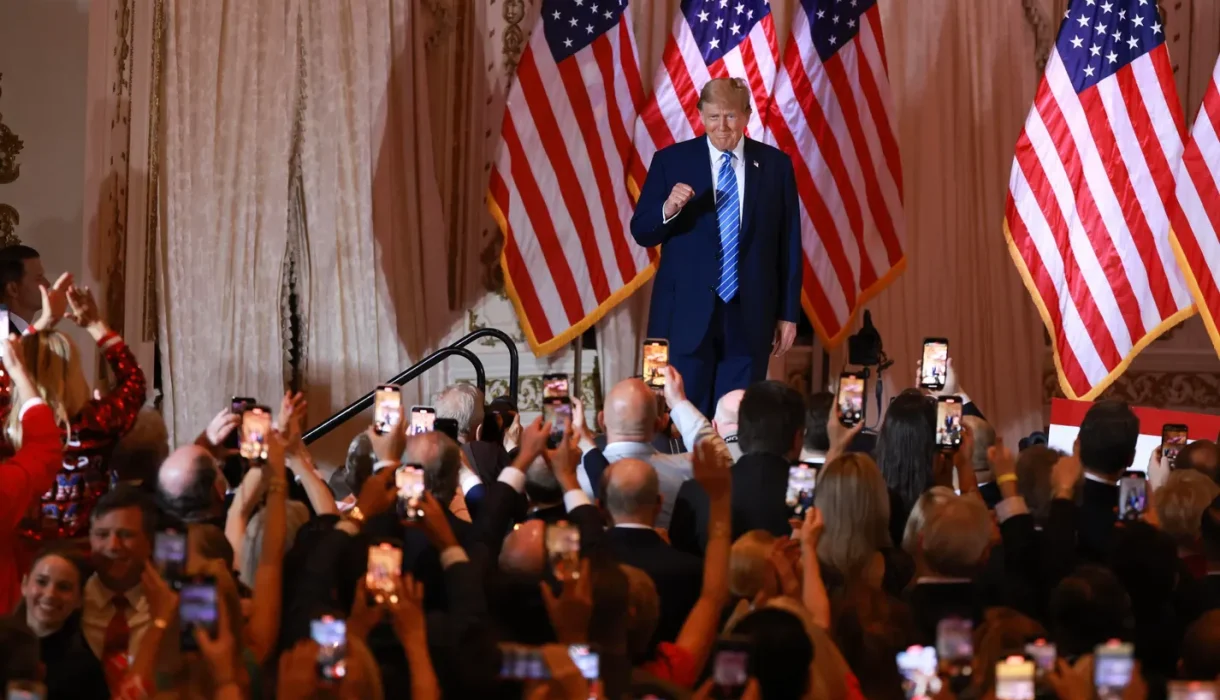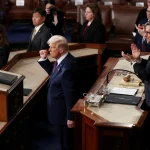
Behind the Scenes: Trump’s Mar-a-Lago Money-Making Weekend amid Market Turmoil
Trump’s Profits at Mar-a-Lago Amid Market Turmoil | Economic Inequality Exposed
This blog post explores the juxtaposition of President Trump’s money-making activities at Mar-a-Lago while global markets experience significant downturns, highlighting broader implications for everyday investors.
As global markets suffered their most significant declines, everyday Americans looked towards their 401ks and savings with a tinge of anxiety. Surprisingly, amidst this chaos, President Trump was enjoying a lavish weekend at Mar-a-Lago, reportedly engaging in various lucrative ventures. This stark contrast raises questions about the morality of wealth amidst crisis and the realities of American financial health.
Market Turmoil: An Overview
The financial landscape has been shaken recently. Major indices like the DOW and S&P 500 have seen significant declines. What does this mean for everyday investors? Let’s break it down.
Recent Market Downturns
In the past month, the DOW dropped by a staggering 10%. This decline is not just a number; it reflects a broader trend affecting many aspects of the economy. The S&P 500 has also followed suit, contributing to a growing sense of unease among investors.
But what caused these downturns? Several factors are at play:
- Global Economic Instability: Events around the world can ripple through markets.
- Rising Inflation: Prices are climbing, which can erode purchasing power.
- Interest Rate Hikes: Central banks are adjusting rates, impacting borrowing costs.
Impact on Everyday Investors
How are these market shifts affecting regular citizens? The answer is alarming. Many individuals are watching their 401k accounts decrease by an average of 15%. This is not just a statistic; it represents real money that people rely on for their futures.
Moreover, concerns about Social Security are rising. As markets falter, the stability of retirement funds becomes questionable. Everyday investors are left wondering: will they have enough to retire comfortably? This uncertainty can lead to stress and anxiety.
Consumer Confidence
Consumer confidence indices have also dropped significantly. When people feel uncertain about their financial future, they tend to spend less. This can create a vicious cycle, further impacting the economy.
As one financial expert noted,
‘In times of economic downturn, the wealth gap becomes more visible.’
This statement rings true. The disparities between the wealthy and the average citizen become stark during financial crises. Those with investments in the stock market may feel the pinch, while others may not have the same safety nets.
Media Representation of the Crisis
How is the media portraying these events? Outlets like the New York Times have reported on the significant drops in global markets. They highlight the worries of ordinary citizens, who are checking their 401ks and fearing for their Social Security payments.
Interestingly, while the markets were tumbling, some individuals, including high-profile figures, were seemingly unaffected. Reports indicated that President Donald Trump was engaged in money-making ventures during this tumultuous time. This contrast raises questions about the disconnect between the wealthy and the average citizen.
As the financial crisis unfolds, the media plays a crucial role in shaping public perception. Are they focusing enough on the struggles of everyday investors? Or are they more concerned with the broader implications for the economy?
In summary, the recent market downturns have had a profound impact on everyday investors. With significant declines in major indices and a drop in consumer confidence, many are left feeling vulnerable. The media’s representation of these events adds another layer of complexity. As the situation evolves, it will be essential to keep an eye on how these factors continue to affect regular citizens.
Trump’s Weekend: An Analysis of Timing and Activities
During a turbulent period in the financial markets, former President Donald Trump was busy at his Mar-a-Lago estate. As stock prices plummeted, many Americans were glued to their screens, anxiously monitoring their 401(k) accounts. Meanwhile, Trump and his family were reportedly engaged in a series of money-making ventures. This stark contrast raises questions about the disconnect between the elite and the average citizen.
Trump’s Activities at Mar-a-Lago
While the markets were experiencing significant drops, Trump was hosting events at his luxurious estate. These gatherings were not just social; they were also lucrative. Reports suggest that Mar-a-Lago was set to earn millions during this weekend. It’s a stark reminder of how different life can be for those in power compared to the everyday American.
- Trump’s events included high-profile gatherings.
- Attendees were likely affluent individuals, eager to network.
- While the economy faltered, the atmosphere at Mar-a-Lago was one of celebration.
As families worried about their financial futures, Trump’s activities seemed almost surreal. It’s as if he was in a different world, one where the economic downturn didn’t reach. This raises an important question: How can someone so wealthy relate to the struggles of the average American?
Money-Making Schemes
In addition to hosting events, Trump and his family were reportedly promoting various business opportunities. These schemes ranged from real estate ventures to other investments. The timing of these promotions is noteworthy. While many were concerned about their financial stability, the Trump family was actively seeking to profit.
- Real estate investments pitched by Trump.
- Opportunities that may not be accessible to the average person.
- Marketing strategies that capitalize on the current economic climate.
Critics argue that these actions reflect a troubling trend. They suggest that the Trump family is more focused on profit than on the well-being of the American public. As one political commentator noted,
‘We were witnessing a disconnect between the elite and the average person.’
This statement encapsulates the sentiment many feel during such economic crises.
Public Perception and Media Comparison
The media has been quick to highlight the contrast between Trump’s lifestyle and the struggles faced by ordinary Americans. While families were worrying about their savings and future, Trump was enjoying the luxuries of his estate. This disparity has not gone unnoticed.
- Media coverage often emphasizes the lavish lifestyle of the elite.
- Public critiques focus on the wealth displayed during times of crisis.
- Many Americans feel alienated by the actions of wealthy individuals.
As the weekend unfolded, it became clear that the Trump family was not just surviving the economic downturn; they were thriving. This raises a crucial point: How can leaders effectively represent the interests of those who are struggling when they seem so far removed from the reality of everyday life?
While the markets suffered, the Trump family was reportedly promoting lucrative business opportunities. This juxtaposition of wealth and worry highlights a significant divide in American society. As the elite continue to profit, many average citizens are left to navigate the uncertainties of their financial futures. The question remains: How can we bridge this gap?
Understanding the Broader Implications for Investors and Public Trust
Political leadership plays a crucial role in shaping financial markets. When leaders make decisions, they can either instill confidence or create panic. This dynamic is especially evident during economic crises. Investors closely watch how leaders respond to challenges. Their reactions can significantly influence market stability.
The Impact of Political Leadership on Financial Markets
Political leaders have the power to sway public sentiment. Their words and actions can lead to market fluctuations. For instance, when a leader expresses optimism about the economy, it can boost investor confidence. Conversely, if they appear uncertain or dismissive, it can lead to a sell-off. This is not just speculation; it’s a well-documented phenomenon in behavioral finance.
Consider the recent past. During the COVID-19 pandemic, various leaders around the world responded differently. Some implemented swift economic relief measures, while others hesitated. The markets reacted accordingly. In the U.S., the swift actions taken by the Federal Reserve helped stabilize the markets. However, mixed messages from political leaders created confusion and uncertainty.
Historical Examples of Economic Crises
History offers numerous examples of how leadership impacts economic outcomes. Take the 2008 financial crisis. The response from then-President George W. Bush and later President Barack Obama was pivotal. Their leadership during the crisis involved significant government intervention. This included bailouts for major banks and stimulus packages aimed at revitalizing the economy.
These actions were not without criticism. Some argued that the bailouts rewarded poor management. Yet, they were necessary to prevent a complete economic collapse. The public’s trust in these leaders fluctuated during this time. Many felt betrayed, while others appreciated the swift action taken to stabilize the economy.
Emerging Concerns About Public Trust
As economic crises unfold, public trust in political figures often diminishes. When leaders appear to prioritize personal gain over public welfare, skepticism grows. A recent report highlighted how, during a market meltdown, some leaders were engaged in money-making schemes. For example, while everyday citizens worried about their financial futures, certain political figures were reportedly capitalizing on the situation.
This behavior raises questions. How can the public trust leaders who seem detached from their struggles? The answer is complex. Trust is built on transparency and accountability. When leaders act in their own interests, it erodes the very foundation of public confidence.
Investor Psychology and Leadership Actions
The reactions of the public to leadership actions during market drops are crucial. Investors are not just influenced by numbers; they are affected by emotions and perceptions. When a leader communicates effectively, it can calm fears. However, if they fail to address public concerns, it can lead to panic selling.
As the economist aptly stated,
‘Leadership during a crisis tests the very fabric of public trust.‘
This statement encapsulates the essence of the relationship between leadership and investor behavior. Trust is fragile and can be easily broken. Leaders must be aware of this as they navigate crises.
In summary, the implications of political leadership on financial markets are profound. Historical examples show that effective leadership can stabilize economies, while poor leadership can lead to chaos. As public trust wanes during crises, the need for transparent and accountable leadership becomes even more critical. Investors are not just looking at numbers; they are looking for reassurance. The actions of political leaders can either bolster or undermine that trust. Understanding this relationship is vital for both investors and leaders alike.
TL;DR: While the global markets faced troubling declines, President Trump was reportedly engaged in profit-making ventures at Mar-a-Lago. This unlikely intersection of politics and personal finance raises critical questions about the impact on everyday Americans.
PoliticsAndEconomy, Money-makingSchemes, InvestorAnxiety, FinancialStrategies, TrumpMar-a-Lago, 401kWorries, TrumpFamilyBusiness, NewYorkTimesTrump, MarketMeltdown, EconomicConcerns
#FinancialStrategies, #InvestorAnxiety, #NewYorkTimesTrump, #Money-makingSchemes, #EconomicConcerns, #401kWorries, #TrumpMar-a-Lago, #PoliticsAndEconomy, #MarketMeltdown, #TrumpFamilyBusiness,#Trump #MarketCrash #MarALago #EconomicInequality #PublicTrust #FinancialCrisis #WallStreet #RecessionFears

